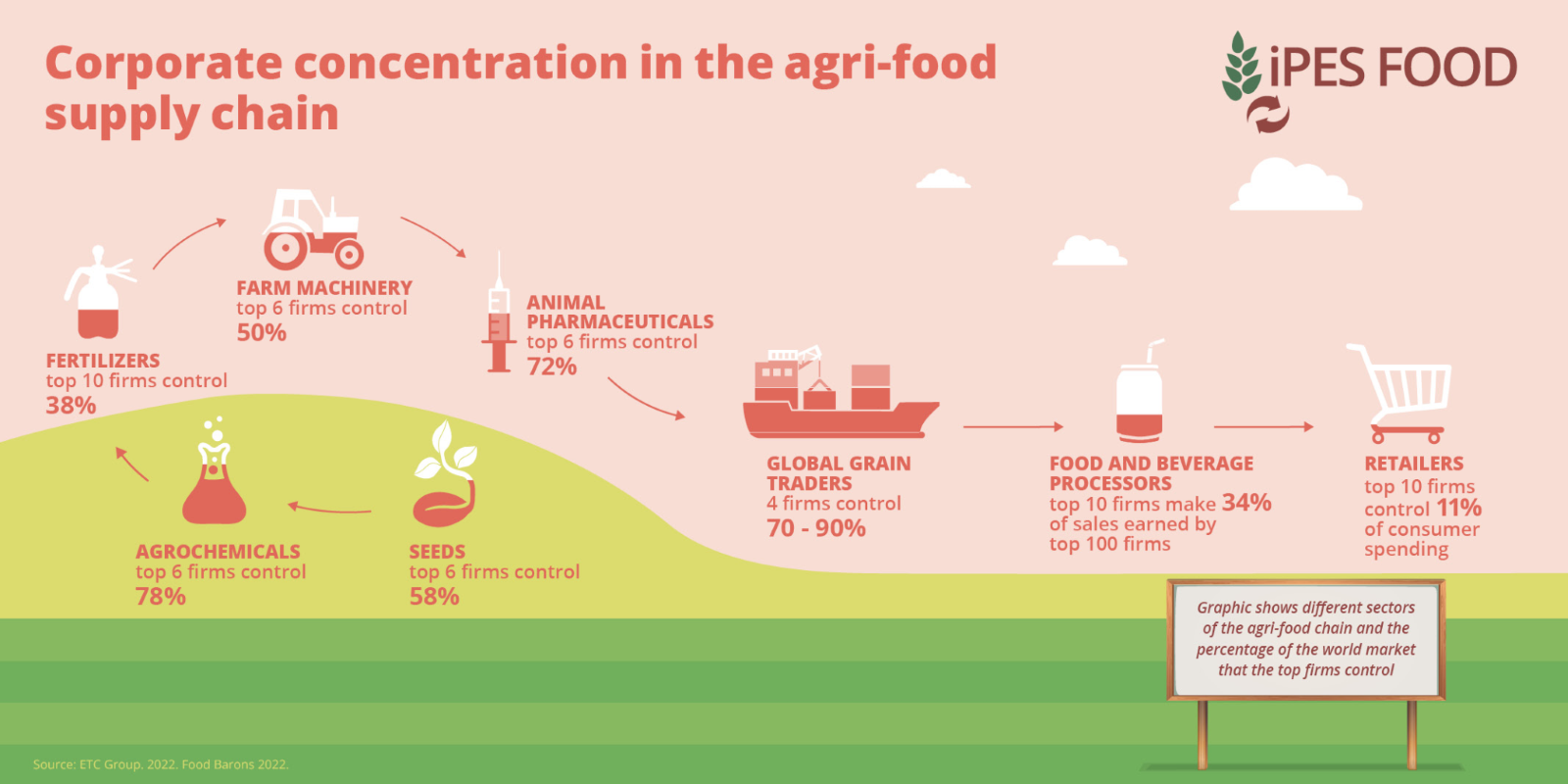Social Justice
Who’s Tipping the Scales Report: IPES
- 02 May 2023
- 7 min read
For Prelims: Food Governance, Bluewashing, CGIAR, FAO, Bill and Melinda Gates Foundation, UN.
For Mains: Who’s Tipping the Scales Report: IPES.
Why in News?
Recently, a report has been released by the International Panel of Experts on Sustainable Food Systems (IPES) titled “Who’s tipping the scales”, highlights how corporate capture of global Food Governance is increasingly taking place in more visible ways and raising concerns over Bluewashing.
What is Bluewashing?
- Bluewashing is using misinformation to deceive consumers into thinking that a company is more digitally ethical and secure than it really is.
- It is just like greenwashing but focused more on social and economic responsibility rather than the environment.
- Greenwashing is a form of deceptive marketing in which a company falsely claims that its products, policies, or programs are environmentally friendly or beneficial, while doing little or nothing to actually assist the environment in practice.
- The term ‘bluewashing’ was first used to refer to companies who signed the United Nations Global Compact and its principles but did not make any actual policy reforms.
- It is often done by companies making vague or unsubstantiated claims about their data privacy and security or making claims about the safety and security of Artificial Intelligence.
What are the Highlights of the Report?
- Corporate Takeover of Food Governance:
- There has been a growing presence of firms in governance and spaces, staking claims to be legitimate actors.
- Over recent decades, corporations have succeeded in convincing governments that they must be central in any discussion on the future of food systems.
- Corporate partnerships provided a key source of funding for global food governance institutions and corporations with greater influence over decision-making.
- Normalization of Corporate Role in Food Governance:
- The role of private corporations in food governance and decision-making has been normalized by public-private partnerships and multi-stakeholder roundtables while public governance initiatives have become heavily dependent on private funding.
- The UN Food Systems Summit, 2021 was described as a watershed moment in highlighting the importance of corporate influence in public health governance.
- The role of private corporations in food governance and decision-making has been normalized by public-private partnerships and multi-stakeholder roundtables while public governance initiatives have become heavily dependent on private funding.
- Concerns Over Corporate Influence:
- Civil society organizations, food scholars, and social movements have expressed concern that the increased involvement of corporations in food governance could lead to a weakening of the public good and impact the rights of people and communities.
- Visible and Invisible Corporate Influence:
- Corporations have influenced global food governance in visible and invisible ways.
- Corporate influence could be seen in global food systems platforms such as the Global Alliance for Improved Nutrition, the Food and Land Use Coalition, and the Scaling Up Nutrition Movement.
- Other less visible ways in which corporate influence was seen in food systems governance was how the private sector enterprises provided political and institutional donations, shaped trading & investment rules and research strategies, and other structural aspects of global food systems.
- Causes of Increases Corporate Involvement:
- The Covid-19 pandemic, coupled with Russia’s invasion of Ukraine and Food Inflation, aggravated the issue of corporate involvement.
- Following these crises, governments and multilateral agencies have been facing fund crunches.
- Incidences of Corporate Involvement:
- The CGIAR (Consultative Group on International Agricultural Research) relied-on funding from private firms and private philanthropic institutions connected to the food industry.
- The Bill and Melinda Gates Foundation which was the CGIAR’s 2nd largest donor in 2020 contributed around USD 100 million, which was far more than what was contributed by individual governments including that of the USA.
- The FAO was also found to have closely collaborated with corporations through industry partnerships throughout its history. However, the details regarding these contributions were not readily available.
What are the Challenges Related to Excessive Corporate Involvement in Global Food Governance?
- Limited Accountability:
- Private players in the food system may not be accountable to the public or to regulatory bodies, which can lead to inadequate monitoring of food safety, quality, and sustainability.
- Private players may also prioritize their profits over the public good, leading to conflicts of interest that can compromise food safety, quality, and sustainability.
- Hyper-nudging:
- Excessive corporate involvement can retrieve everyday transactions data (digital wallets to automated food services), which they can combine with information harvested online to manipulate people’s eating habits.
- Unequal Distribution of Benefits:
- Private players may prioritize the interests of powerful actors, such as large-scale producers and retailers, over small-scale farmers and consumers, leading to unequal distribution of benefits from the food system.
- Limited Transparency:
- Private players may not disclose important information about their practices, products, and policies, making it difficult for stakeholders to assess the impacts of their actions on food System.
- Exacerbate Food Security:
- If the control of the Food System goes to big data, technology and e-commerce platforms, which may exacerbate food insecurity and further environmental degradation.
- Artificial intelligence is re-engineering ecosystems, and robotic tractors and drones if rolled out as fast as digital infrastructures allow. Millions of rural dwellers will be forced to migrate to urban areas.
What are the Recommendations?
- Create a robust conflict of interest and grievance policies and new mechanisms grounded in Human Rights, that allow people's organizations, social movements and other civil society actors to participate in food governance on their own terms.
- Build up autonomous processes and spaces for claims and proposals from people’s organizations and social movements, especially those that build agency for marginalized communities.







